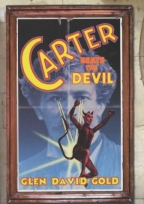Carter Beats the Devil
Glen David Gold
Hodder & Stoughton General
UK Hardcover First
ISBN 0340794976
563 pages ; $45.00
January 30, 2002
Reviewed by Rick Kleffel
Copyright © Rick Kleffel 2002

REFERENCES
COLUMNS
|
|
|
Carter Beats the DevilGlen David GoldHodder & Stoughton GeneralUK Hardcover FirstISBN 0340794976563 pages ; $45.00January 30, 2002Reviewed by Rick KleffelCopyright © Rick Kleffel 2002 |
|
|
REFERENCES |
COLUMNS |
Historical fiction seems to be on the upswing these days, ever since the notable success of Caleb Carr's 'The Alienist'. Glen David Gold achieves a similar level of detail and enjoyability with a completely different style and feel in 'Carter Beats the Devil'. Based on the life of an actual stage magician from the beginning of the (last) century, 'Carter Beats the Devil' is sunlit, positive, and occasionally (but only apparently) gruesome. Gold's first novel is remarkably good. It's the kind of book you should buy two copies of, because you'll want to loan it to all your friends even before you've finished it.
'Carter Beats the Devil' covers the magician's life from his first experience as a young magician to his final curtain, and a bit beyond. The breadth of the narrative might seem overly wide at first, but the story rapidly coalesces as Gold follows the career of the magician. His focus is on Charles Carter, but he eventually draws in Philo T. Farnsworth and the invention of television, the death of Warren G. Harding, two marriages, an evil competitor, and the birth of Gay Pride in San Francisco, to name just a few threads. To his credit, Gold focuses on his characters -- Charles Carter, the black-sheep performer from a banking family, his loves, his brother, his co-performers in vaudeville and stage shows. Occasionally his plot might strain credulity, but the reader's enjoyment will quickly sweep any doubts aside.
Charles Carter is created as a bit of a rebel, but not obnoxiously so. As a boy, the cruelty of the times brings him to magic as a form of escape. He rejects his commonsense banking heritage for a chance at the stage, and the reader cheers his successes as much as the audiences. What Gold does remarkably well in this novel is to keep a sunny disposition, a positive attitude and the reader's patience and attention. Part of his success is due to his subject; he can happily describe hideously gruesome illusions. The illusions themselves are clever enough to keep the reader's attention, and awful enough to counter Gold's upbeat outlook without annihilating it. As a historical novel, this book is something of an inversion of 'The Alienist'. Where Carr's novel is dark and murky and complex, Gold's is bright an sunny and complex. But both propel the reader into our world in another time, a world that is so different from our current reality as to be almost alien. The detail required to create the history is a ferocious bit of world-building, as they call it in the sci fi trade, and enjoyable on much the same level as sci fi feats of world building. Gold's great accomplishment is to do this with a smile, and to pass that smile seamlessly on to the reader.